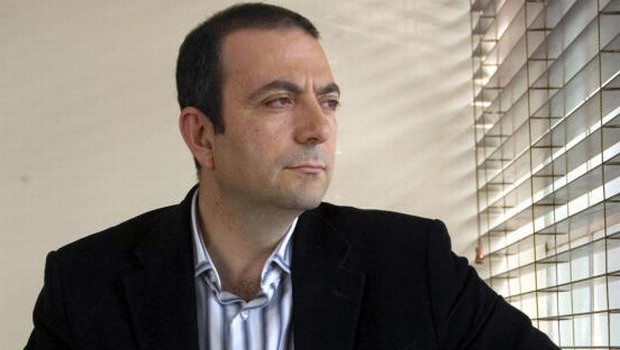
This January 31, 2006 file photo shows Hany Abu-Assad, director of the Oscar-nominated Palestinian film “Paradise Now,” posing for a photo at Warner Bros. Studios in Burbank, California. Abu-Assad is also director of “Omar,” one of the more talked-about films at the 2013 Cannes Film Festival. (AP Photo/Damian Dovarganes, file)
Omar by director Hany Abu-Assad, known for the 2005 award-winning film Paradise Now, is a political thriller interwoven with a story of trust and betrayal as two lovers are torn apart by Israel’s secret police and Palestinian freedom fighters.
Omar, a baker, is in love with Nadia, the sister of his friend Tarek who is a Palestinian fighter on the West Bank.
Arrested and humiliated by the Israeli military police, Omar, played by Adam Bakri, joins Tarek and colleague Amjad in a mission to kill an Israeli soldier and ends up imprisoned, tortured, and under pressure to betray his friends.
Earmarked a traitor, he starts to doubt Nadia’s fidelity, especially as she is also pursued by Amjad, and his life falls apart as he is pursued across the ravaged Palestinian landscape.
Abu-Assad said he was delighted by the reception his film received at Cannes, where picky critics are known to boo films that do not meet their expectations, and he hoped the festival would help gain international attention for Omar.
“But my first audience is the Palestinians and the Arabs and I hope they will be engaged with it,” said Abu-Assad after the film’s premiere at the 66th Cannes festival.
“Even if they are not on the West Bank or Palestinians … it is about the youth and Arab world now and I hope they can accept it and that they can relate to it.”
ABU-ASSAD SAID it had taken him about a year to raise the USD 1.5 million needed to make Omar, which was shot in the West Bank and the Israeli–Arab town of Nazareth last year.
He said it was the first film to be fully funded by individual Palestinians and Palestinian businesses.
“For the first time, we convinced businessmen from Palestine to invest in the film industry. It’s incredible,” he said.
A second Palestinian film at Cannes, the short film “Condom Lead” by brothers Mohammed and Ahmad Abunassar, was funded by the filmmakers themselves. It is the first time a Palestinian film has been included in the short film competition at Cannes.
Omar is one of 18 films being screened in the second major competition category at Cannes, Un Certain Regard, which showcases emerging directors and more daring films than those in the main competition vying for the top prize, the Palme D’Or.
Cambodian director Rithy Panh’s documentary L’Image manquante (“The Missing Picture”) is one of the experimental movies in Un Certain Regard pushing story-telling boundaries.
He used small clay figures intercut with historical footage to tell the story of how his family perished in the Khmer Rouge’s brutal revolution after their 1975 capture of Phnom Penh.
Other films in Un Certain Regard to receive positive reviews include Sofia Coppola’s The Bling Ring, starring Emma Watson in a gang of celebrity-obsessed teenagers breaking into their Hollywood idols’ homes to steal luxury goods.
Fruitvale Station by American filmmaker Ryan Coogler was praised by critics as provocative with exceptional performances.
The film is based on the true story of Oscar Grant, an unarmed San Francisco Bay Area resident who was shot and killed by police in the early hours of New Year’s Day in 2009.
French director Rebecca Zlotowski’s Grand Central, about love in a nuclear power plant received favorable reviews, as did L’Inconnu du lac (Stranger by the Lake), a murderous gay love story by French filmmaker Alain Guiraudie.
